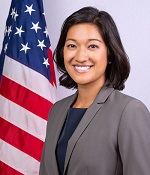The Embassy is celebrating EducationUSA Week!
I'm Yuki Kondo-Shah, the Public Affairs Officer at the U.S. Consulate Fukuoka, and I'm excited to offer our Japanese student readers some perspectives and tips from my previous career as an admissions officer.
Before joining the Department of State, I spent many years in selective admissions, evaluating prospective students at Dartmouth College, Stanford University, and the Harvard Kennedy School of Government. Part of my portfolio was to evaluate Japanese high school students, so I’m happy to be able to share some of the insights I gained from reading thousands of personal essays and participating in the committee meetings that select students.
Did you know that more than 1 million students from all over the world study in the United States? International students bring different viewpoints and ideas to our campuses in America, and they are an important part of the learning environment.
“We value the tremendous depth of cultural diversity that our international and overseas student community brings to our campus, and Japan is certainly no exception,” said Michael Elgarico, dean of undergraduate admissions at California Lutheran University. “The state of California and the local community has always held strong ties to not only Japan, but the greater Asian Pacific region. As such, we seek to cultivate and strengthen those ties through students who come from abroad to pursue their studies at our university and welcome the invaluable perspective they bring as members of the Cal Lutheran campus!"
U.S. universities love international students, and they invite you to come and study in the U.S.!
I hope this series of articles will be helpful to those of you aiming to apply for selective schools in America. I will cover a range of topics, from the application essay to recommendation letters, extracurricular activities, standardized testing, and admissions interviews. With the Jan. 2 application deadline looming, this is a great time to celebrate International Education Week and complete your application to study in the United States.
The first step to preparing for a U.S. college degree is to understand the difference between the university application processes in Japan and the United States. In Japan, the juken test score influences university admissions, but in America, many universities use the "wholistic evaluation method," in which they look at a variety of documents to get a clear picture of the student's academic environment, personal background, and leadership potential, and what inspires them. 855 U.S. universities use the Common Application, which asks for your basic personal profile, academic background and grades (transcript), standardized test scores, activities and leadership, teacher recommendations, and personal essays.
Ever wondered who exactly is reading your application after you hit the submit button online? Well, it can be a variety of people. When I worked in the admissions office, many people were, like me, fresh graduates looking at the next generation of young applicants. Others were very experienced officers who had been doing this for more than 30 years. Each officer brings a unique perspective to the process, but the most important thing to keep in mind is that one of these officers needs to advocate to admit you. Make that officer’s job easy by preparing a stellar application. Let's step into the admissions committee room and find out what U.S. universities are looking for when evaluating students!
 This article is the first in a five-part series for students and their teachers on how to prepare college applications, in which Consulate Fukuoka Public Affairs Officer Yuki-Kondo Shah shares her observations and expertise from her previous career in admissions as an interviewer at Dartmouth College and an application reader at Stanford University and Harvard University.
This article is the first in a five-part series for students and their teachers on how to prepare college applications, in which Consulate Fukuoka Public Affairs Officer Yuki-Kondo Shah shares her observations and expertise from her previous career in admissions as an interviewer at Dartmouth College and an application reader at Stanford University and Harvard University.Read the other articles in the series:
- 650 Words. Limitless Possibilities. Your Chance to Stand Out from the Rest
- Extracurricular Activities: What You Do Outside School Matters
- Six Tips for Getting Strong Recommendation Letters
- Dos and Don'ts for Writing Teacher Recommendation Letters
Click here for more information on studying in the U.S. and EducationUSA programs throughout Japan.







COMMENTS2
孫が、アメリカの大学へ行きたいのですが、情報は、どうしたら、わかりますか?数学が、よく出来ます。
アメリカ大使館で、予約して、教えていただけますか?17才です。
[…] ・アメリカの大学は皆さんを待っています! […]
LEAVE A COMMENT
TOP